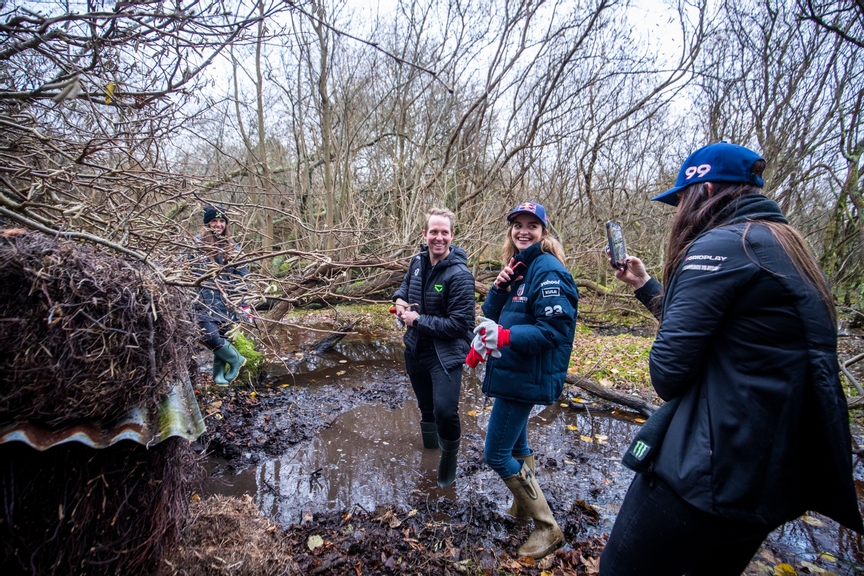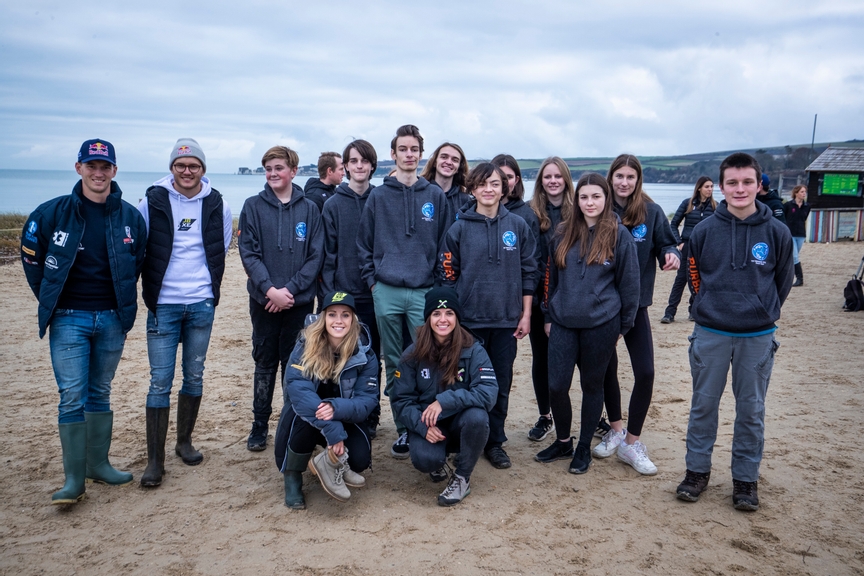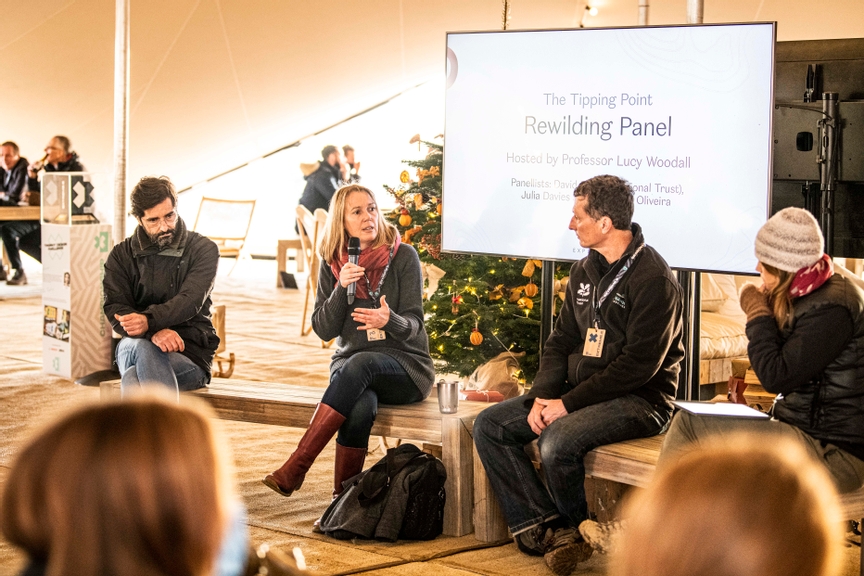Four ways Extreme E achieved results off the course in Dorset
Extreme E has big ambitions aside from delivering thrilling racing. These are met through its Legacy Programmes and its collaborations with some of the most innovative companies around the world.
Girls on Track
On the Thursday before the highly anticipated Season Finale, Extreme E joined forces with female initiative Girls on Track UK. 40 lucky schoolgirls were introduced to life behind the scenes of this ground-breaking sport-for-purpose championship and to the many opportunities available for them in the world of motorsport.
The girls, all aged between 11 and 12-years-old and from the Dorset area, were given the thrilling opportunity to sit inside the cockpit of the colossal ODYSSEY 21. They also met several of the series’ female drivers, including Veloce Racing’s Jamie Chadwick, JBXE’s Mikaela Åhlin-Kottulinsky, and SEGI TV Chip Ganassi Racing’s Sara Price.

Also on the eye-opening menu of activities was an innovative STEM coding challenge courtesy of Enovation Consulting, as well as the chance to perform a real-life wheel change against the clock in a pit-stop competition. This was followed by a lesson in vital resuscitation skills by professional motorsport doctor Clare Morden. To finish off an already unforgettable day, the awestruck girls were also given a front row seat to view Extreme E’s free practice session.
Veloce Racing’s Jamie Chadwick said: “It was an absolute delight to be part of the Girls on Track UK event here in Dorset yesterday. It was an amazing day and the girls seemed to absolutely love it! As a Girls on Track UK ambassador, I am always so pleased to get involved with the events whenever I can. I am so incredibly lucky to be doing a job that I love and so to be able to inspire young girls that are thinking of coming into the industry one day is really important to me.”

Ali Russell, Chief Marketing Officer at Extreme E, said: “Girls on Track UK is such an important initiative and one that perfectly aligns with Extreme E’s equality mission. Above all, though, it was an absolute joy to see how much the schoolgirls loved the activities that were on offer to them here yesterday.
“As a series, we welcome and encourage females to join us in all aspects; from engineering to mechanics, design to media – and I think yesterday’s event was a great opportunity to open these schoolchildren’s eyes to the exciting future career possibilities that await them!”
Tidy Planet
As part of its mission to promote sustainability and protect the planet, Extreme E turned its attention to the food waste generated at a race site and converted the waste from the Jurassic X Prix into 1000KWh of electricity, which is enough to power around 85 houses for a day, or approximately fully charge 18 Extreme E car battery packs.
For the final leg of the racing voyage, the Extreme E event crew used food waste drying technology, supplied by organic waste solutions firm Tidy Planet. The end-product was then taken 12 miles northwest of Bovington to local organic waste processor Eco Sustainable Solutions’ anaerobic digestion plant in Piddlehinton, where it is to be turned into biogas and converted into renewable energy.
Legacy Programme
Extreme E is supporting the National Trust for its Dorset Legacy Programme to help improve biodiversity in the UK.

Biodiversity and well-functioning ecosystems are critical for human existence, economic prosperity, and a good quality of life. And yet, biodiversity is currently declining at a faster rate than at any time in human history.
In 2022, The National Trust is hoping to reintroduce beavers to Purbeck, in the wetlands at the heart of the Studland’s dune system. Last week’s legacy day saw inspiring talks from National Trust experts and Extreme E’s own Prof. Lucy Woodall before the world-class drivers got their hands dirty, building a lodge for the beavers to inhabit when they arrive from Scotland.
Also present at the legacy day were the Swanage School Race Team, who got the exciting opportunity to interact with the drivers in a thought-provoking Q&A session. In similar fashion to Extreme E, the Swanage team were made up of equal parts male and female drivers, who are currently in the process of building an electric car of their own and took inspiration from the experiences of our drivers.

Prof. Lucy Woodall, Principal Scientist, Nekton, and Extreme E Scientific Committee member, said: “In Dorset we have seen the remarkable diversity in habitats such as sand dunes, heathland, marsh and woodland, in a relatively small area. By taking a landscape-wide approach to management, the National Team managing the area can work with the local community to enhance biodiversity by connecting areas of protection. There is an important message that meaningful long-term partnerships result in positive results for people and nature.”
The Tipping Point
A series of thought leadership talks called The Tipping Point are now a firm fixture in the schedule. One of the talks, hosted by Prof. Lucy Woodall, concentrated on rewilding. Here, media and guests heard from the National Trust’s David Brown, Julia Davies, Founder of environmental fund and campaigner We Have the POWER, and Extreme E’s Francisco Oliveira.
Another talk hosted by Prof. Richard Washington of the Extreme E Scientific Committee saw Yadvinder Malhi CBE FRS, professor of Ecosystem Science at the University of Oxford, Dr. Matthew J. Bell, EY UK&I climate change and sustainability leader, and Prof. Lucy Woodall discussing the importance of biodiversity.
Discussion points from both panels included: giving nature the space to move by linking habitats together; protecting ecosystems as rewilding will always be a step away from the original; the need to start thinking of humans and nature as one, which means not excluding humans from these habitats; how the economy needs to change with nature in mind to allow farming to be more diverse; and companies beginning to factor in the environment and biodiversity into their business models.

Francisco Oliveira of the Extreme E Science Committee said: “We held two very interesting Tipping Point discussions – both very important and interconnected. In the first panel we had a chance to talk about how important in Dorset, and in the Amazon, restoration is for climate change, as well as biodiversity loss. It is a priority for the United Nations, too. We had interesting discussions on these issues, talking about the natural environment and how humans can play their part. Human beings are so key to restoring and reintroducing species to communities.
“The second Tipping Point talk discussed the connections between climate change and biodiversity loss. They are there and from the discussion we found that we must take care of both of them and identify how they can benefit from each other in a way that we can provide positive solutions. It must work for both and the balance is so important.
“We have to remember that now is the time to act – we no longer have time just for discussions and the United Nations have been very clear on this. We must act and humans are so important for this to succeed.
“It was amazing to be part of these Tipping Point discussions and to see people engaged and interested in our work. When we had the Q&A with Jenson Button, for instance, he was very clear on how much he has learned this year and found it amazing. This is something that I will never forget. If we can keep raising awareness of these issues across Extreme E and beyond, and have all of these people on board supporting us to tackle the climate crisis, it will have a huge impact.”